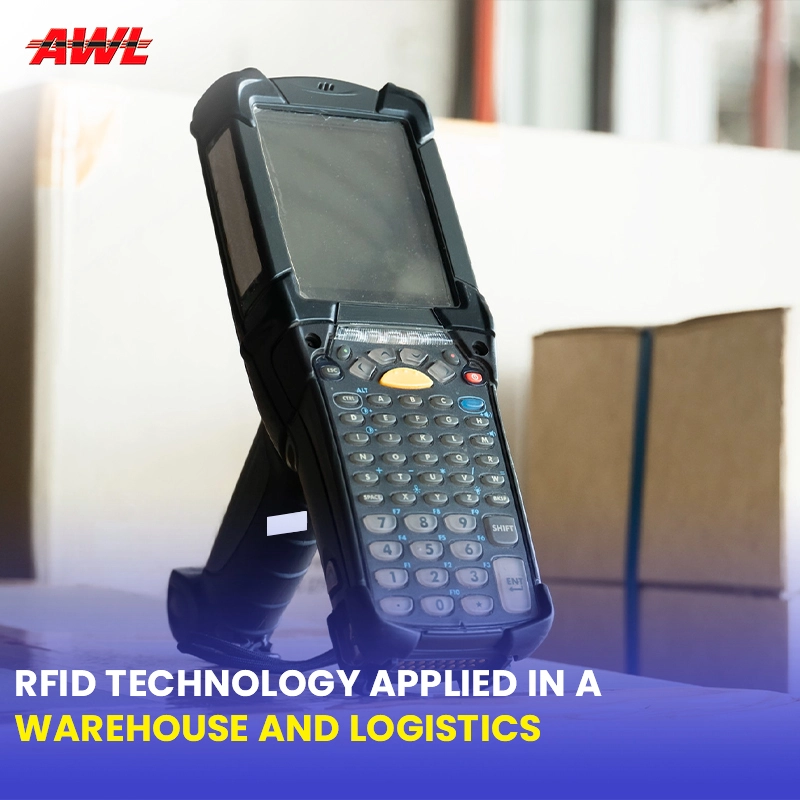
Among the many disruptive technologies, the RFID (Radio Frequency Identification) inventory tracking technology stands out as a game changer. This blog will guide you through the complexity of this innovative system, providing light on its operating procedures, the numerous benefits it provides to inventory management, and AWL India's strategic leadership in embracing this cutting-edge technology. As firms traverse the challenges of contemporary logistics, the RFID inventory monitoring technology provides unique benefits, altering old inventory management paradigms. We will investigate the real-time capabilities, accuracy increases, and operational efficiencies that RFID technology brings to the supply chain. Join us on this trip to learn not only how RFID works, but also why AWL India's proactive integration places them as forerunners in designing the future of logistics solutions.
These tags, housing unique identification information, play a pivotal role in facilitating effortless tracking and monitoring across the entire supply chain. Unlike traditional barcode systems that necessitate line-of-sight scanning, RFID excels by offering non-line-of-sight capabilities, enabling swift and accurate data capture. The radio frequency communication between the tags and readers allows for seamless information exchange, contributing to the system's real-time tracking prowess. This fundamental distinction positions RFID as a game-changer, revolutionizing inventory management by eliminating the constraints associated with traditional scanning methods and ushering in a new era of efficiency, accuracy, and operational fluidity within the intricate landscape of supply chain dynamics.
RFID tags are critical in enabling easy tracking and monitoring across the whole supply chain. Unlike standard barcode systems, which require line-of-sight scanning, RFID shines by allowing for non-line-of-sight data capture, allowing for quick and precise data acquisition. The radio frequency communication between the tags and readers enables for smooth information transmission, which contributes to the system's ability to follow objects in real-time. This fundamental distinction establishes RFID as a game changer, revolutionizing inventory management by removing the constraints associated with traditional scanning methods and ushering in a new era of efficiency, accuracy, and operational fluidity within the complex landscape of supply chain dynamics.
RFID tags are affixed to individual items or pallets, each containing a unique identifier. These tags store information such as product details, manufacturing dates, and other relevant data.
RFID readers, strategically placed at key points in the supply chain, emit radio frequency signals. When an RFID-tagged item comes within range, the reader captures the transmitted data, instantly updating the system.
The RFID system facilitates two-way communication. As the RFID reader captures data from the tag, it can also send information back to the tag, allowing for real-time updates and adjustments.
All the captured data is stored in a centralized database, creating a comprehensive and accurate record of inventory movements. This database can be accessed and managed through specialized software, providing real-time visibility into stock levels, locations, and other crucial details.
The RFID (Radio Frequency Identification) inventory tracking system offers a host of transformative benefits, revolutionizing traditional inventory management practices. Its real-time capabilities, unparalleled accuracy, and efficiency enhancements make it an indispensable tool in the dynamic landscape of supply chain management. By eliminating line-of-sight constraints, RFID facilitates seamless data capture, optimizing tracking and monitoring throughout the supply chain. In this section, we will delve into the specific advantages that businesses gain by incorporating RFID technology into their inventory management processes.
RFID technology significantly reduces errors in inventory tracking. The automated data capture minimizes the risk of manual entry mistakes, ensuring that the recorded information is precise and reliable.
The instantaneous data transmission and updates enable real-time visibility into inventory levels. This heightened transparency allows for proactive decision-making, reducing the chances of stockouts or overstock situations.
RFID eliminates the need for manual scanning, making inventory tracking faster and more efficient. This efficiency not only saves time but also reduces labor costs associated with traditional inventory management methods.
The streamlined nature of RFID inventory tracking simplifies logistics operations. With accurate and up-to-date information readily available, AWL India can optimize their supply chain processes, resulting in smoother operations and improved overall efficiency.
The warehouse is a critical hub in any supply chain, and RFID proves particularly beneficial in this environment:
Traditional methods of stock counting involve labor-intensive processes and can be time-consuming. RFID enables swift and accurate stock counts, allowing for more frequent and efficient inventory checks.
The real-time tracking capabilities of RFID contribute to minimizing losses due to theft or misplacement. Any irregularities in inventory movement can be promptly identified and addressed, reducing the risk of shrinkage.
RFID provides insights into the exact location of each item in the warehouse. This visibility allows AWL India to optimize storage space, reduce clutter, and enhance overall warehouse organization.
AWL India, as a leading logistics service provider, recognizes the transformative power of RFID inventory tracking. By incorporating this technology into their operations, they underscore their commitment to delivering top-tier services including Real-time data provided by RFID allows AWL India to make informed decisions swiftly. This agility is crucial in adapting to dynamic market demands and unforeseen disruptions. AWL India's adoption of RFID aligns with their client-centric approach. The enhanced accuracy and efficiency in inventory management directly translate into better services for their clients, fostering stronger partnerships. As a forward-thinking logistics company, AWL India's integration of RFID technology positions them as industry leaders. This strategic move not only enhances their operational capabilities but also reinforces their reputation for innovation and reliability.
In the ever-evolving logistics landscape, the RFID inventory tracking system emerges as a key enabler of efficiency and precision. AWL India's proactive adoption of this technology exemplifies its dedication to staying at the forefront of industry advancements. The benefits of RFID extend beyond streamlined operations, offering a glimpse into the future of logistics where real-time visibility and data-driven decision-making are paramount. As businesses continue to navigate complex supply chain challenges, the integration of RFID technology stands as a testament to AWL India's commitment to delivering exceptional logistics solutions.

